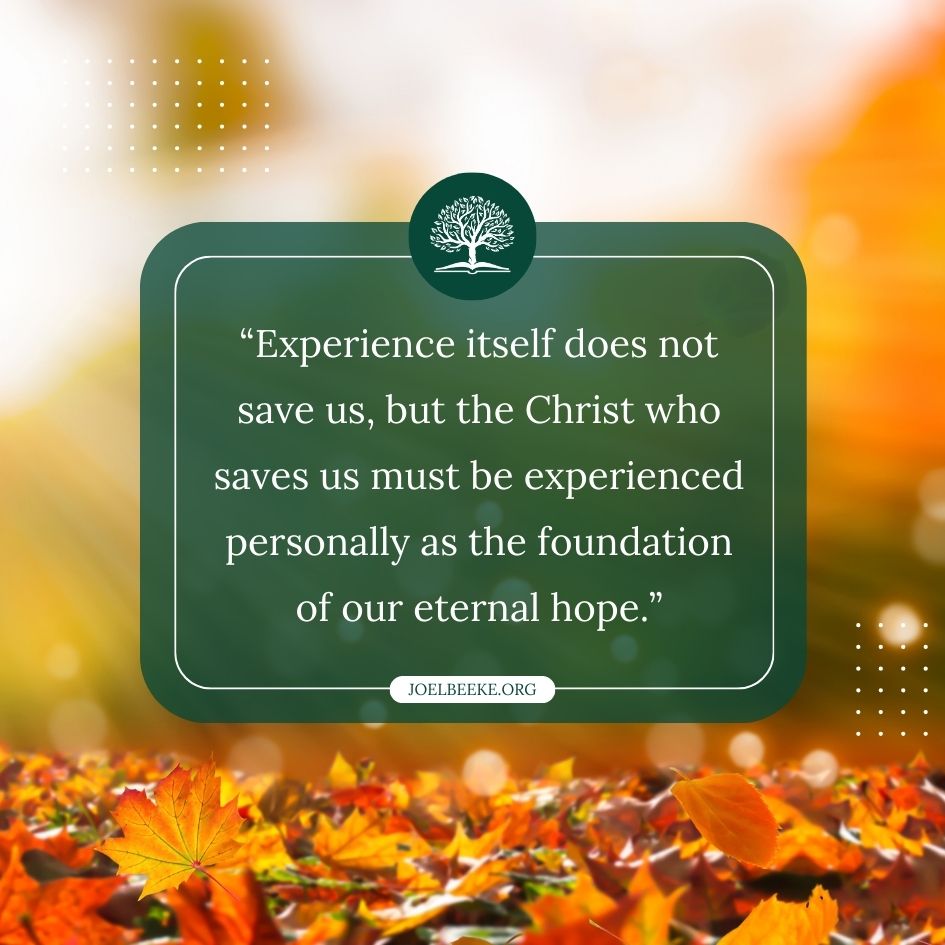
Experimental preaching must be discriminatory. I am not referring to discrimination on the basis of skin color or ethnicity. Neither am I speaking of any form of bigotry and hatred. Discriminatory preaching aims to distinguish the Christian from the non-Christian so that people can diagnose their own spiritual conditions and needs. The preacher applies biblical truth to help his hearers test whether they belong to Christ and have his Spirit (Rom. 8:9; 2 Cor. 13:5).
Ministers use the “keys of the kingdom of heaven” (Matt. 16:19), entrusted to us by Christ, to open or shut the door of the kingdom by the preaching of the gospel of the forgiveness of sins (John 20:23). How does the preacher do that? The Heidelberg Catechism (Q. 84) says:
Thus: when according to the command of Christ it is declared and publicly testified to all and every believer, that, whenever they receive promise of the gospel by a true faith, all their sins are really forgiven them of God for the sake of Christ’s merits; and on the contrary, when it is declared and testified to all unbelievers, and such as do not sincerely repent, that they stand exposed to the wrath of God and eternal condemnation, so long as they are unconverted; according to which testimony of the gospel, God will judge them both in this and in the life to come.1Quoted in Joel R. Beeke, ed., Doctrinal Standards, Liturgy, and Church Order (Grand Rapids, MI: Reformation Heritage Books, 2003), 64.
In a manner of speaking, through discriminatory preaching, the Holy Spirit brings judgment day near to the consciences of men, either to their vindication and joy or to their guilt and terror.
Preaching must also target the spiritual maturity and condition of the preacher’s audience. This is no easy task, because many kinds of hearers are present. Archibald Alexander (1772–1851) writes: “The word of God should be so handled, that it may be adapted to Christians in different states and stages of the divine life; for while some Christians are like ‘strong men,’ others are but ‘babes in Christ, who must be fed with milk, and not with strong meat.’”2Archibald Alexander, “Rightly Dividing the Word of Truth,” in The Princeton Pulpit, ed. John T. Duffield (New York: Charles Scribner, 1852), 42. Alexander goes on to explain how the Reformed preacher also should rightly divide the Word by making specific applications to the backsliding, the worldly minded, the afflicted, and the dying believer.3Alexander, “Rightly Dividing the Word of Truth,” 42–45.
Charles Bridges (1794–1869) presents three aspects of discriminatory preaching. First, preachers must distinctly “trace the line of demarcation between the Church and the world,” he says. Ministers must bear in mind that there are fundamentally two kinds of hearers before them—the saved and the unsaved. Bridges stresses the biblical support for this division:
They are described by their state before God, as righteous or wicked (Prov. 14:32; Mal. 3:18)—by their knowledge or ignorance of the Gospel, as spiritual or natural men (1 Cor. 2:14–15)—by their special regard to Christ, as believers or unbelievers (Mark 16:16; John 3:18, 36)—by their interest in the Spirit of God, “being in the Spirit, or having not the Spirit of Christ” (Rom. 8:9)—by their habits of life, “walking after and minding, the things of the Spirit, or the things of the flesh” (Rom. 5:1, 5)—by their respective rules of conduct, the word of God, or “the course of this world” (Ps. 119:105; Matt. 25:46)—by the Masters whom they respectively obey, the servants of God, or the servants of Satan (Rom. 6:16)—by the road in which they travel, the narrow way or the broad road (Matt. 7:13–14)—by the ends to which their roads are carrying them, life or death—heaven or hell (Rom. 8:13; Matt. 25:46).4Charles Bridges, The Christian Ministry (London: Banner of Truth, 2006), 277.
Second, preachers must identify the line that separates the false professor (the hypocrite) from the true believer. Jesus himself draws that line sharply when he speaks of those who claim to belong to his professing church and who cry, “Lord, Lord, have we not prophesied in thy name? . . . and in thy name done many wonderful works?” only to hear his response: “I never knew you: depart from me, ye that work iniquity” (Matt. 7:22–23).
Of this second line of discrimination, Bridges writes: “Every part of the Christian character has its counterfeit. How easily are the delusions of fancy or feeling mistaken for the impressions of grace. The genuineness of the work of God must be estimated, not by the extent, but by the influence, of Scriptural knowledge—not by a fluency of gifts, but by their exercise in connexion with holiness and love.”5Bridges, The Christian Ministry, 278. David Brainerd (1718–1747) puts it this way: “Labor to distinguish clearly upon experiences and affections in religion, that you may make a difference between the ‘gold’ and the shining ‘dross’ (Prov. 25:4); I say, labor here, as ever you would be an useful minister of Christ.”6Quoted in Jonathan Edwards, The Life of David Brainerd, in The Works of Jonathan Edwards, vol. 7, The Life of David Brainerd, ed. Norman Pettit (New Haven, CT: Yale University Press, 1984), 495.
Ministers need to help their hearers rightly examine themselves. Second Corinthians 13:5 says, “Examine yourselves, whether ye be in the faith; prove your own selves.” Pastors must not assume or presume that all churchgoers, including children, are saved. They also are to avoid presumed church “unregeneration,” as if only a few who have professed faith in Christ are truly saved. Rather, preachers are to present repeatedly before their people the biblical marks of those who have been born again and have come to Christ by way of saving faith and genuine repentance.
Third, Bridges says, preachers “must also regard the different individualities of profession within the Church.”7Bridges, The Christian Ministry, 279. Like Jesus, preachers must distinguish between the blade, the ear, and the full corn in the ear (Mark 4:28). Like Paul, they must differentiate between babes and adults in grace (1 Cor. 3:1). Like John, they must preach to various believers as little children, young men, and fathers in grace (1 John 2:12–14).
Alexander makes the case for discriminatory preaching. He writes: “The promises and threatenings contained in the Scriptures [must] be applied tothe characters to which they properly belong. How often do we hear a preacher expatiating on the rich consolations of the exceeding great and precious promises of God, when no mortal can tell, from anything which he says, to whom they are applicable. In much of preaching, there is a vague and indiscriminate application of the special promises of the covenant of grace, as though all who heard them were true Christians, and had a claim to the comfort which they offer.” After concluding that, in true preaching, “the saint and the sinner are clearly distinguished by decisive scripture marks, so that every one may have a fair opportunity of ascertaining to which class he belongs, and what prospects lie before him,” Alexander goes on to lament:
It is much to be regretted that this accurate discrimination in preaching has gone so much out of use in our times. It is but seldom that we hear a discourse from the pulpit which is calculated to afford much aid to Christians in ascertaining their own true character; of which will serve to detect the hypocrite and formalist, and drive them from all their false refuges. In the best days of the reformed churches, such discriminating delineation of character, by the light of Scripture, formed an important part of almost every sermon. But we are now more attentive to the rules of rhetoric than to the marks of true religion. How do Owen, Flavel, Boston, and Erskine abound in marks of distinction between the true and false professor? And the most distinguished preachers of our own country,—the Mathers, Shepards, Stoddards, Edwardses, as also the Blairs, Tennents, Davies, and Dickinsons, were wise in so dividing the word of truth, that all might receive their portion in due season.8Alexander, “Rightly Dividing the Word of Truth,” 40–42.
In short, discriminatory preaching must remain faithful to God’s Word. Grace is to be offered indiscriminately to all (Matt. 13:24–30); however, the divine acts, marks, and fruits of grace that God works in his people must be explained to encourage the elect to know themselves aright and to uncover the false hopes of the hypocrites. As Bishop Joseph Hall (1574–1656) says of the minister, “His wisdom must discern betwixt his sheep and wolves; in his sheep, betwixt the wholesome and unsound; in the unsound, betwixt the weak and the tainted; in the tainted, betwixt the natures, qualities, degrees of the disease, and infection; and to all these he must know to administer a word in season. He hath antidotes for all temptations, counsels for all doubts, evictions for all errors; for all languishings, encouragements.”9Joseph Hall, “To My Brother Mr. Sa. Hall,” Epistle 5 in The Works of the Right Reverend Joseph Hall, ed. Philip Wynter (Oxford: Oxford University Press, 1863), 6:231.
Robert Hall (1764–1831) says that it is difficult to decide “which we should most anxiously guard against, the infusion of a false peace, or the inflaming of the wounds which we ought to heal.”10Robert Hall, “On the Discouragements and Supports of the Christian Ministry,” in The Works of the Rev. Robert Hall (New York: G. & C. & H. Carvill, 1830), 2:138. Little wonder, then, that Richard Baxter (1615–1691) warns preachers that when, as spiritual physicians, they apply the wrong spiritual medication to their parishioners, they can become murderers of souls, which has grave ramifications for eternity.11Quoted in Bridges, The Christian Ministry, 280. Preachers must be honest with every soul and strive to bring them and the touchstone of Holy Scripture together.
Such preaching teaches us that unless our religion is genuinely experienced, we will perish. Experience itself does not save us, but the Christ who saves us must be experienced personally as the foundation of our eternal hope (Matt. 7:22–27).
Excerpt from
Reformed Preaching
By Joel Beeke








